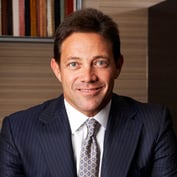Passive investing is “a big animal” in the market ecosystem, eating other animals that need to change their behavior. “That’s having ripple effects on the entire financial industry,” argues Robin Wigglesworth, global finance correspondent for the Financial Times, in an interview with ThinkAdvisor.
His new book, “Trillions: How a Band of Wall Street Renegades Invented the Index Fund and Changed Finance Forever” (Portfolio/Penguin, Oct. 12), has been proclaimed “a tour de force” by Mohamed El-Erian, president of Queens’ College, Cambridge, and chief economic advisor at Allianz.
Wigglesworth considers the growth of passive investing “one of the most consequential challenges to the way capitalism functions that we face in the coming decades.”
The big three index fund providers are BlackRock, Vanguard and State Street, which have more than $20 trillion in index funds under management.
Wigglesworth is concerned that the chief index fund providers will “keep getting bigger until there will be just a handful of big asset managers that, in practice, control the majority of the voting shares of most major companies, both in the U.S. and overseas.”
Wells Fargo launched the first index fund in 1971, which was actually a small account rather than a fund, per se, according to Wigglesworth. It was open only to institutional investing.
Five years later, John Bogle, at his newly formed firm, Vanguard, introduced the first index fund for retail investors.
In the interview, Wigglesworth predicts “a vibrant future” for active exchange-traded funds and foresees a growing number of mutual funds that will be converted into active ETFs.
With their “Lego-like characteristics,” ETFs are “reshaping finance,” he says. “You can put anything into an ETF structure,” including gold and Bitcoin.
Direct indexing, within so-called Index Investing 3.0, will be a trillion-dollar industry within 10 years and “an important and powerful tool for a lot of financial advisors,” he predicts.
At first, people dismissed the index fund, laughing at such a “preposterous” idea, Wigglesworth says.
One active investment manager even created and circulated a poster blaring: “Stamp Out Index Funds!” They’re “Unamerican!” It wasn’t long before index investing was “vitriolically” attacked, says Wigglesworth, who focuses on big trends transforming markets and investing.
Previously, he was the Financial Times’ U.S. markets editor. Before joining the paper in 2008, he was with Bloomberg News.
ThinkAdvisor recently interviewed Wigglesworth, who was speaking by phone from Norway, where he’s based. When the conversation shifted to shareholder pressure for companies to focus more on ESG investing, he called the issue “potentially problematic and dangerous.” Then he went on to tell why.
Here are highlights of our interview:
THINKADVISOR: Why will “the growth of passive investing prove to be one of the most consequential challenges to the way capitalism functions that we face in the coming decades,” as you write?
ROBIN WIGGLESWORTH: It’s changing the nature of financial markets and how they function, and that’s having ripple effects on the entire financial industry.
It’s a big animal in the market ecosystem eating other animals that are needing to change their behavior.
So if you’re an investment bank, like Goldman Sachs or Bank of America Merrill Lynch, you have to fundamentally retool what you do and how you do it in a world where passive is the largest part of the investment universe and growing more rapidly than anything else.
The big index fund [providers] will keep getting bigger until there will be just a handful of big asset managers that, in practice, control the majority of the voting shares of most major companies, both in the U.S. and overseas.
“The debate over the impact of index funds will undoubtedly grow in the coming years,” you write. Why?
Because investment groups are under increasing pressure from many different areas to use their talent for “good.”
Shareholders are putting pressure on every major company in the world to [focus] more on social issues or the environment or corruption.
This is potentially problematic and dangerous given that these are fundamentally private companies managing other people’s money and cannot escape the pressure groups that come from both left and right.
There’s a phenomenal concentration of power in BlackRock, Vanguard and State Street, which have over $20 trillion worth of index funds under management.
If they continue to grow at their current rate, they’ll attract political and regulatory scrutiny, as well as scrutiny from all sorts of interest groups as a way to leverage their views.
Does ESG investing fit in here?
Yes, ESG is a prime example of this. The asset managers are under immense pressure to do more on ESG.
You can see the beginning of a backlash from some politicians; for example, [Sen.] Marco Rubio [R-Fla.] and [Sen.] Ted Cruz [R-Texas] have recently spoken out about what they call “woke capitalists” and that BlackRock and Vanguard shouldn’t be trying to de facto legislate on issues such as climate change or social change.
You write that direct indexing may be the next stage of “Index Investing: 3.0.” Please discuss.
It seems that everybody is getting into direct indexing right now — we all want a bit more customization in our lives, and direct indexing is sort of the incarnation of that in index funds.
In the next five to 10 years, direct indexing will be a trillion-dollar industry easily, but I don’t think it’s ever going to rival the ETF market or index funds. It will grow quickly, but won’t be as big as its main rivals, Indexing 1.0 and Indexing 2.0.
Direct indexing will be an important and powerful tool for a lot of financial advisors, but on scale, I doubt it will ever compete with plain vanilla index funds and ETFs.








 November 05, 2021 at 07:47 PM
November 05, 2021 at 07:47 PM












 Copyright © 2024 ALM Global, LLC. All Rights Reserved.
Copyright © 2024 ALM Global, LLC. All Rights Reserved.